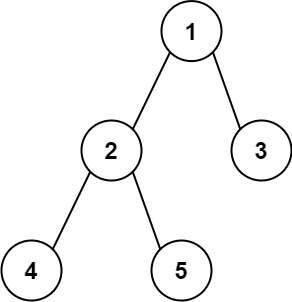Problem
Given the root of a binary tree, return **the length of the *diameter* of the tree**.
The diameter of a binary tree is the length of the longest path between any two nodes in a tree. This path may or may not pass through the root.
The length of a path between two nodes is represented by the number of edges between them.
Example 1:

Input: root = [1,2,3,4,5]
Output: 3
Explanation: 3 is the length of the path [4,2,1,3] or [5,2,1,3].
Example 2:
Input: root = [1,2]
Output: 1
Constraints:
The number of nodes in the tree is in the range
[1, 104].-100 <= Node.val <= 100
Solution
/**
* Definition for a binary tree node.
* function TreeNode(val, left, right) {
* this.val = (val===undefined ? 0 : val)
* this.left = (left===undefined ? null : left)
* this.right = (right===undefined ? null : right)
* }
*/
/**
* @param {TreeNode} root
* @return {number}
*/
var diameterOfBinaryTree = function(root) {
return dfs(root)[0];
};
var dfs = function(node) {
if (!node) return [0, 0];
var left = dfs(node.left);
var right = dfs(node.right);
var child = Math.max(
node.left ? left[1] + 1 : 0,
node.right ? right[1] + 1 : 0,
);
var branch = (node.left ? left[1] + 1 : 0) +
(node.right ? right[1] + 1 : 0);
return [
Math.max(
left[0],
right[0],
branch,
),
child,
];
};
Explain:
nope.
Complexity:
- Time complexity : O(n).
- Space complexity : O(1).